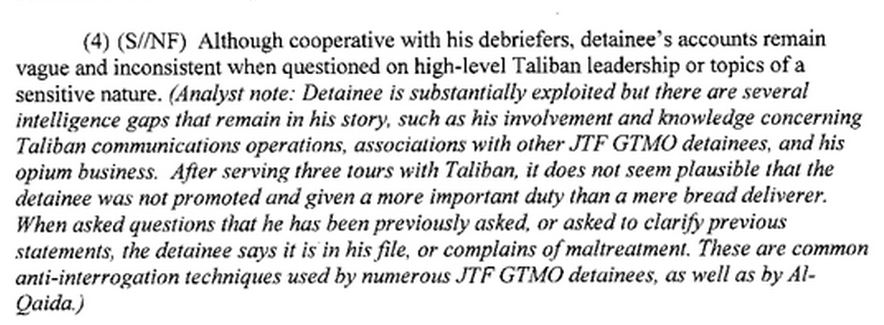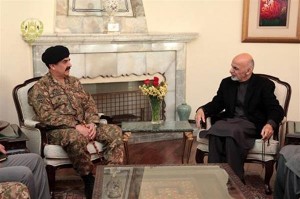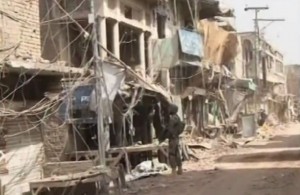Karachi’s Airport has resumed operations today, but a deadly late night attack shut it down for many hours overnight. It appears that ten militants entered the airport Sunday night, most likely uniformed as airport security personnel, and killed up to 18 people before they were killed by airport security and rapidly responding military units. The TTP, Pakistan’s Taliban, has claimed responsibility for the attack. The New York Times and Reuters, however, chose to be very selective in how they reported the TTP’s claim of responsibility. Both news outlets left out the TTP’s prominent mention of the US drone strike in November that killed TTP leader Hakimullah Mehsud in describing the TTP’s reasons for the attack. By contrast, AP and the Washington Post included the TTP’s reference to the drone strike.
Here is how the Post article opens:
Heavily armed gunmen disguised as security forces attacked Karachi’s international airport Sunday night, killing at least 18 people before government troops regained control early Monday. The Pakistani Taliban claimed responsibility for the assault, which appeared to dash hopes for peace talks.
The government said all 10 of the attackers were killed in more than five hours of fighting at the airport, which would bring the total number of deaths to 28. A doctor at Karachi’s Jinnah Hospital said 18 bodies were brought to the morgue there and that 11 of the dead were airport security personnel, the Associated Press reported. The bodies of the attackers remained in police custody.
In a statement Monday, Shahidullah Shahid, a spokesman for the Pakistani Taliban, said the attack was in response to recent Pakistani military airstrikes in northwestern Pakistan and to a U.S. drone strike in November that killed Hakimullah Mehsud, the leader of the radical Islamist group.
Shahid added the attack should be viewed as a sign that Prime Minister Nawaz Sharif’s efforts to engage the group in peace talks had failed.
“The message to the Pakistani government is that we are still alive to react to the killings of innocent people in bomb attacks on their villages,” said Shahid, adding the attack followed months of intensive planning.
The AP article twice mentions the attack as in response to the drone killing of Mehsud, and although it mentions Pakistan’s airstrikes in the tribal regions after peace talks broke off, it doesn’t tie those air strikes to the TTP reasons for the attack. The Times and Reuters, in contrast, only tie the attack to the air strikes and not to the Mehsud drone strike. From the Times:
The Pakistani Taliban claimed responsibility Monday for a ferocious overnight assault in Karachi that stretched into the morning in which gunmen infiltrated Pakistan’s largest international airport and waged an extended firefight against security forces that resulted in 29 deaths and shook the country’s already fragile sense of security.
The attack “was a response to the recent attacks by the government,” Shahidullah Shahid, a spokesman for the Taliban, said by telephone. “We will continue carrying out such attacks.” He insisted, however, that the group was seeking to resuscitate peace talks with the government.
And from Reuters:
The Pakistani Taliban, an alliance of insurgent groups fighting to topple the government and set up a sharia state, said they carried out the attack in response to air strikes on their strongholds near the Afghan border and suggested their mission was to hijack a passenger plane.
“It is a message to the Pakistan government that we are still alive to react over the killings of innocent people in bomb attacks on their villages,” said Shahidullah Shahid, a Taliban spokesman.
“The main goal of this attack was to damage the government, including by hijacking planes and destroying state installations.”
Pakistan’s Dawn News gives the broader range of TTP explanations:
The TTP further said: “It’s just the beginning, we have taken revenge for one (Mehsud), we have to take revenge for hundreds.”
/snip/
Shahidullah Shahid moreover dismissed the Pakistani government’s peace talks methodology as a “tool of war”.
Shahidullah Shahid said the attack was planned much earlier but had been postponed due to the peace talks.
The TTP spokesman in a statement issued to the media said that the attack was also carried out to avenge the killing of Hakimullah Mehsud in a US drone strike.
“We carried out this attack on the Karachi airport and it is a message to the Pakistani government that we are still alive to react over the killings of innocent people in bomb attacks on their villages,” TTP spokesman Shahidullah Shahid said.
Pakistani Taliban claimed responsibility for the attack, saying it was revenge for the army’s air strikes in areas along the Afghan border where the insurgents are based.
By citing only Pakistan’s air strikes against the TTP, the New York Times and Reuters portray the Karachi airport attack as a problem that is solely due to politics internal to Pakistan. That is a gross misrepresentation of the situation, as the US drone strike on Hakimullah Mehsud came at an extremely critical time when the peace talks first began to look like a concrete possibility. That US strike was a huge external intervention by the US and clearly put Pakistan on a path to even more bloodshed. At least the Washington Post and AP allow their readers to see that blowback for US intervention played a significant role in this attack.



